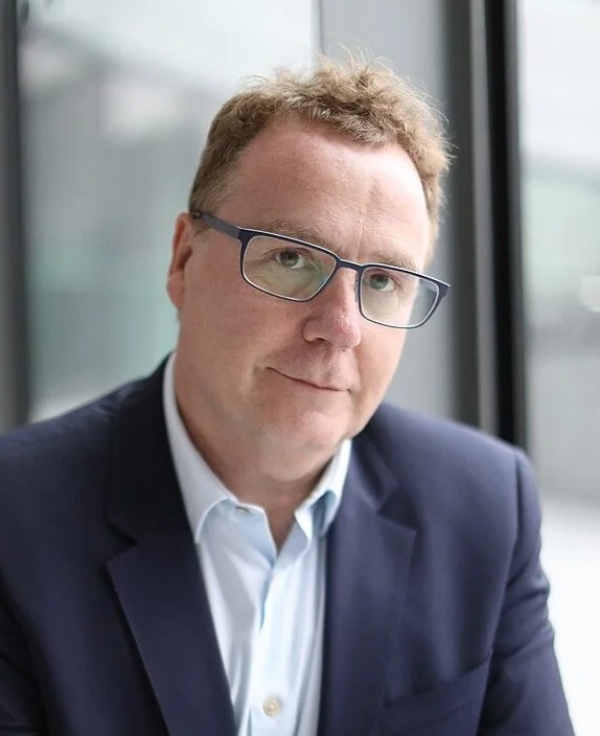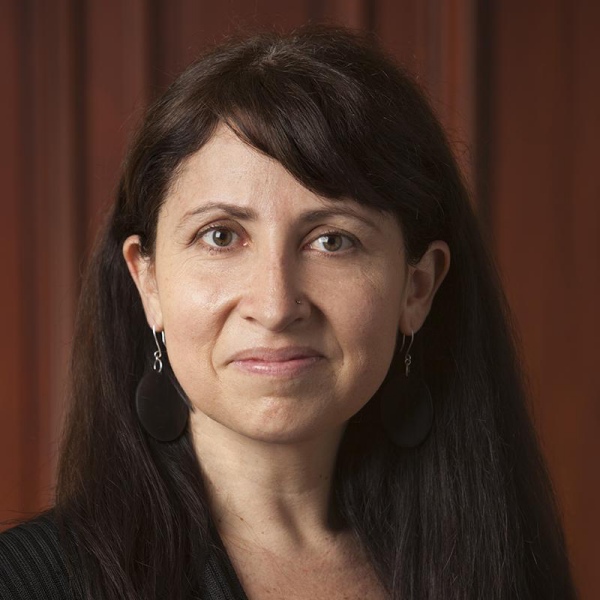Featured Guest
You’ll find this guest among our growing roll of Urban Champions.
-

Greg Clark
Global Head of Future Cities and New Industries, HSBC Group
-

Gabriella Gómez-Mont
Founder and Principal, Experimentalista
-

Alicia John-Baptiste
President & CEO, SPUR
5 Key
Takeaways
A roundup of the most compelling ideas, themes and quotes from this candid conversation
1. The pandemic is an agent of change, with impacts differing by city and sector.
Covid-19 has changed consumption, mobility, leisure, and work patterns. The regional context is key to understanding what has changed and what lies ahead. Locales including Dubai, Shanghai and Hong Kong have put in place incentives to attract local residents back to city centres. City centres of the future may shift to emphasize habitat and health, innovation, and experience. Downtowns that are diversified will have the greatest number of options going forward.
2. The pandemic has impacted cities of the global south. Good local governance and trust is indispensable for recovery.
Many migrant workers have left cities of the global south and the informal economy has suffered. The flight to the suburbs often cited in other contexts is not a reality for cities in developing countries. Credit cards to access e-commerce are inaccessible to many. Working from home is not viable when residential spaces are already cramped. Instead, some cities are doing more with less within existing office buildings via strategies including shift work. The pandemic may result in greater prominence for secondary cities. Local government will play an important role in the recovery, and countries with strong local governments will do better.
3. Diversify the inputs of a city in order to diversify the outputs.
The pandemic presents an opportunity to rethink and reimagine cities. A deep shift in organizational mindset is needed, from economic efficiency to public values and civics. City centres are not only economic hubs but also historic, political, and cultural hearts. Public and civic spaces are needed now more than ever. Social imagination and lived experience can play an important role alongside objective data. Social interactions, weak ties, and hyper-local approaches can be powerful levers for communities to overcome challenges.
4. Let social entrepreneurs lead the way to repair the strain on social cohesion wrought by the pandemic.
The pandemic is both a mirror and a microscope. San Francisco’s population has decreased, reflecting a “tale of two pandemics”: some residents left voluntarily thanks to the ability to embrace flexible work arrangements, while others relocated when affordability challenges made remaining simply untenable. Three Bay Area cities have recovery taskforces which identified equitable economic recovery as their number one priority. One tactic to spur equitable economic recovery is to bolster small business by finding new ways to facilitate access to capital.
5. Prioritizing investments in key areas can help drive a robust and equitable recovery.
Digital infrastructure and net zero strategies will be important to prioritize for investment, along with climate resilience, land banking for housing, and public transportation. A new organizing idea to build up civic collaboration can help re-equip cities financially for long-term investment
Additional Resources
Full Panel
Transcript
Note to readers: This video session was transcribed using auto-transcribing software. Manual editing was undertaken in an effort to improve readability and clarity. Questions or concerns with the transcription can be directed to events@canurb.org with “transcription” in the subject line.
Full Audience
Chatroom Transcript
Note to reader: Chat comments have been edited for ease of readability. The text has not been edited for spelling or grammar. For questions or concerns, please contact events@canurb.org with “Chat Comments” in the subject lin
From Canadian Urban Institute: You can find transcripts and recordings of today’s and all our webinars at https://canurb.org/citytalk
00:14:44 Canadian Urban Institute: Welcome! Folks, please change your chat settings to “all panelists and attendees” so everyone can see your comments.
00:15:05 Canadian Urban Institute: Attendees: where are you tuning in from today?
00:15:32 David Low: Hello again! David Low, Vic Park BIA in YYC
00:15:34 Canadian Urban Institute: You can find transcripts and recordings of today’s and all our sessions at https://www.canurb.org/citytalk Keep the conversation going #restorethecore #bringbackmainstreet #citytalk @canurb
To support CityTalk and the Canadian Urban Institute’s other city building initiatives, please donate at www.canurb.org/donate.
00:15:38 John Jung: Hello from Toronto and New York City
00:16:04 Annie MacInnis: Hello! Annie from Kensington, Calgary
00:16:17 Karen Dar Woon: Third generation settler whose family arrived at Turtle Island from China circa 1910. Born, raised and grateful to remain on lands of xʷməθkʷəy̓əm (Musqueam), Sḵwx̱wú7mesh Úxwumixw (Squamish Nation) and səlilwətaɬ (Tsleil-Waututh) peoples.
00:16:31 Purshottama Reddy: Good evening, form Durban in South Africa.
00:16:45 Evangeline Sadler: Hi again from Montreal..
00:16:53 Kimberley Nelson: Hi from Bridgeland, Calgary AB
00:17:02 Adam Thompson: I’m going to hold to my heart being describes as “fabulous” by Mary for all my days:)
00:17:14 Reg Nalezyty: hi from Thunder Bay ON
00:17:51 Théa Morash: Hello from St. John’s, Newfoundland & Labrador!
00:18:14 Canadian Urban Institute:
Greg Clark, Global Head, Future Cities & New Industries, HSBC Group https://www.linkedin.com/in/prof-greg-clark-cbe-01145119/
Greg Clark is an author, global advisor, chairman and non-executive director. Clark has advised more than 200 cities, 50 national governments and a wide array of bodies including the OECD, Brookings Institution, the World Bank and the Urban Land Institute (ULI) on strategies for city development and investment. He also advises global investors and corporate service companies on how to align with city leaders. He currently serves as the Global Head of Future Cities and New Industries at HSBC Group.
00:19:12 Lana Hall: Hello! Joining you all from The Financial District BIA in downtown Toronto.
00:20:27 Canadian Urban Institute: Reminding attendees to please change your chat settings to “all panelists and attendees” so everyone can see your comments.
00:21:14 Donna Franz: thank you – Hello from Kelowna, in the Okanagan BC
00:21:23 Céleste Cordonnier: Hello from Hawkesbury, ON
00:22:20 Paul Shaker: Hello from The Hammer
00:24:18 Charles S: Yes, BCaaS
00:27:30 Donna Franz: ESG ? refers to –
00:27:41 Canadian Urban Institute: Reminding attendees to please change your chat settings to “all panelists and attendees” so everyone can see your comments.
00:27:46 Margaret Kish: what’s ESG?
00:28:07 Mary W. Rowe: Environment Social and Governance
00:28:13 Charles S: Environment sociala and governance
00:28:33 Mary W. Rowe: its metric the corporate community is starting to adopt
00:28:37 Diane Dyson: Hawkesbury, ON is a really interesting place, with the challenge of renewing a fading industrial base. Glad to have you here virtually! (My parents lived there long ago,)
00:31:22 Céleste Cordonnier: Yes it is a really interesting place indeed, I’ve started to work there since november as the town’s planner. We are currently working on projects to revitalize the Main Street ! I hope the dynamics will improve for locals.
00:32:07 Robert Plitt: In these examples where a significant return to the office is happening are we seeing any change in the social contract?
00:33:22 Diane Dyson: Share or follow along on Twitter using the hashtags: #RestoreTheCore #BringBackMainStreet #CityTalk
00:34:25 Canadian Urban Institute:
Gabriella Gomez-Mont, Founder and Principal, Experimentalista https://www.linkedin.com/in/gabriella-gomez-mont-1186a417b/
Gabriella Gómez-Mont is the former Chief Creative Officer of Mexico City, and the founder of Laboratorio para la Ciudad (2013 – 2018), the award-winning experimental arm of the Mexico City government. She now directs Experimentalista, a new type of nomadic and creative office specialized in cities – and that constantly shifts shape to accommodate high-level, transdisciplinary collaborations across the world.
00:34:41 Canadian Urban Institute: Besides her fascination with all things city, Gabriella is a journalist, visual artist, and director of documentary films, as well as a creative advisor to several cities, universities and companies. She has received several international recognitions for her work in different fields, such as the first prize in the Audi Urban Future Award, the Best Art Practice Award given by the Italian government, The Creative Bureaucrats Award by the German government, and the TED City 2.0 Prize, among others.
00:35:34 Adam Thompson: In London (Canada!) we are grappling with that central question of restoring confidence in public services. We’re looking hard at a community model where we can work collectively on this challenge with our businesses and service delivery agencies. Would love any insights participants may have.
00:39:59 Canadian Urban Institute: We love your comments and questions in the chat! Share them with everyone by changing your chat settings to “all panelists and attendees”. Thanks!
00:40:35 Mike Kasij: sutera-inground.com Our work in urban centres focusing on rethinking waste has been proving very effective and improving usage and confidence in public spaces.
00:43:13 Adam Thompson: thanks Mike. I’ll take a look
00:43:46 Melissa Ricci: Can you expand on why they prohibited Airbnbs in the historic centre?
00:51:15 Canadian Urban Institute:
Alicia John-Baptiste, President & CEO, SPUR
https://www.linkedin.com/in/alicia-john-baptiste/
Alicia John-Baptiste is the president and CEO of SPUR. She is responsible for defining the overall vision and strategy for the organization. Alicia served for three years as SPUR’s deputy director, overseeing policy and strategic initiatives and running the organization day to day. Prior to joining SPUR, she held senior public administration and public policy roles for the City and County of San Francisco, including chief of staff positions at both the San Francisco Planning Department and the San Francisco Municipal Transportation Agency.
00:51:48 Canadian Urban Institute:
Abha Joshi-Ghani, Senior Adviser, Public Private Partnerships, The World Bank https://www.linkedin.com/in/abha-joshi-ghani-7aa4b91/
Abha Joshi-Ghani is currently Senior Adviser for Public Private Partnerships, Infrastructure Analytics and Guarantees at the World Bank. Prior to this she was Director for Knowledge and Learning at the World Bank in the Change Knowledge and Learning Vice Presidency. She headed the Urban Development and Local Government Practice in the World Bank’s Sustainable Development Network from 2007-2012 where she oversaw the Bank’s work on Urban Policy and Strategy and Knowledge and Learning. She led the World Bank’s Urban Strategy in 2010. She also headed the Global Urbanization Knowledge Platform from 2011-2012. She is the Chair of the World Economic Forum Global Agenda Council on Urbanization. She has worked primarily on infrastructure finance and urban development at the World Bank in South and East Asia, Africa, and the Middle East. Before joining the World Bank she worked for the Reserve Bank of India.
00:52:27 DAVID TWIGG: Mark Granovetter’s work on the strength of weak ties is a must read for urbanists!
00:57:38 Kay Matthews: How important is rebuilding Consumer Confidence in Public Transit in our future “Reenchanting of our Cores”?
01:00:31 LoriAnn Girvan: Many of our cities’ suburbs are disproportionately low-income and home to newcomers and people of colour – facing higher impacts from COVID and for whom our downtown cores can be distant and unwelcoming places. How do we think about redistributing investment and resources to create more nodes of ‘complete communities’ that serve those excluded vs replicating the centre and the rings disparities?
01:01:26 Robert Plitt: Are we seeing any evidence in a decline in innovation as a result of Covid distancing?
01:03:02 Canadian Urban Institute: Reminding attendees to please change your chat settings to “all panelists and attendees” so everyone can see your comments.
01:03:40 paul mackinnon: Great question, Robert! Are most people, especially in the knowledge/creative economy really as productive when they work from home? Any studies on this yet?
01:04:56 Olusola Olufemi: Difficult to operate the 15 minute city in Lagos, Nigeria for example. Also the informal economy and over 200 slums in Lagos (density, crowding, lack of water and sanitation) were real concerns during the lockdown because of the non-compliance to social distancing, masking and hand washing measures. Generally, there is huge contrast in which cities in developing countries, particularly, Nigeria, experienced the COVID-19 pandemic when compared to the global north cities.
01:05:51 Karen Dar Woon: re: Winter cycling… Copenhagen is a year-round cycling city!
01:07:32 Johanna Hurme: re: Winter Cycling…So is Oulu, Finland, near the Arctic Circle
01:13:25 Jenna Dutton: Oops sorry meant to reply to attendees … So is Calgary, Edmonton, Winnipeg, Toronto – granted we could use to invest more in winter friendly bike infrastructure (it’s not that fun to bike through all the snow piled in bike lanes 🙂 )
01:14:12 Robert Plitt: employee and co-operative ownership…
01:15:41 Diane Dyson: Lagos is the largest city in the continent! The only blessing around COVID is that the median age in Nigeria is 18 years old. I am glad the issue of informal work and housing was raised by Abha Josh-Ghani.
01:17:13 David Low: yes – how do we nudge the giant holding companies to care about their local vacancies and be more adapti
01:17:19 David Low: adaptive
01:18:42 Brad Krizan: Great question David. Activation of spaces in the short term can be highly impactful, yet Landlord’s and Asset Managers don’t seem to understand the benefit
01:18:52 Canadian Urban Institute: Our next session begins at 1:30pm and will feature provocations from leaders across Canada and around the world on what’s possible for the future of Canada’s downtowns. Register for this session here: https://us02web.zoom.us/webinar/register/WN_kATe2qxcT32UlejGDXgpcQ
01:20:03 Olusola Olufemi: Social capital, political will, smart governance are key to recovery in major cities.
01:20:09 Donna Franz: Do you feel that recovery could be accelerated by infusing funds to create more accessible cities, so that the greatest possible population can access, use and reuse, services, cultural opportunities etc in the city centre?
01:21:01 Brad Krizan: I think its important to better understand what the real sweet spot is between policy alignment and organic measures….how do we steward toward that so change can happen quicker and be stickier?
01:21:24 Canadian Urban Institute:
Greg Clark, Global Head, Future Cities & New Industries, HSBC Group https://www.linkedin.com/in/prof-greg-clark-cbe-01145119/
Gabriella Gomez-Mont, Founder and Principal, Experimentalista https://www.linkedin.com/in/gabriella-gomez-mont-1186a417b/
Abha Joshi-Ghani, Senior Adviser, Public Private Partnerships, The World Bank https://www.linkedin.com/in/abha-joshi-ghani-7aa4b91/
Alicia John-Baptiste, President & CEO, SPUR https://www.linkedin.com/in/alicia-john-baptiste/
01:21:25 Charles S: You have to ease policies holding back this change for this agility. That’s a big hurdle.
01:22:39 Charles S: Why is there social inequality in housing? What is driving this?
01:23:50 Canadian Urban Institute: You can find transcripts and recordings of today’s and all our sessions at https://www.canurb.org/citytalk Keep the conversation going #restorethecore #bringbackmainstreet #citytalk @canurb To support CityTalk and the Canadian Urban Institute’s other city building initiatives, please donate at www.canurb.org/donate.
01:24:46 Robert Plitt: yup- move to collective ownership – and rethink how municipalities control public land assets. Turn over to communities.
01:25:33 Guy Huntingford: Here in Calgary we have 30% vacancy of our office space and an ongoing conversation about switching this space to residential. Economics don’t always work.
01:26:38 Brad Krizan: Guy you are spot on, those conversion proforma’s don’t pencil out, our company tried moving one ahead and it doesn’t work for a private sector owner….
01:26:57 Kay Matthews: REITS – more interested in the shareholder return, than the community return?
01:26:59 Jenna Dutton: Re: Calgary: Yep, we recently published a research paper on just that topic! 🙂 https://www.policyschool.ca/wp-content/uploads/2021/02/Office-Vacancy-Graham-Dutton.pdf
01:27:32 Charles S: Thanks everyone!
01:27:48 Brad Krizan: Well REITS do have a fiduciary duty to their owners so that is an important consideration for them.
01:27:52 Canadian Urban Institute: You can find transcripts and recordings of today’s and all our sessions at https://www.canurb.org/citytalk
01:28:23 Shahinaz Eshesh: Thank you all!
01:28:31 Canadian Urban Institute: Our next session begins at 1:30pm and will feature provocations from leaders across Canada and around the world on what’s possible for the future of Canada’s downtowns. Register for this session here: https://us02web.zoom.us/webinar/register/WN_kATe2qxcT32UlejGDXgpcQ
01:28:57 Donna Franz: Thank you
01:28:58 Robert Plitt: Thanks.. great seesion



